Connect With Us
Blog
Items filtered by date: October 2024
Reminder: When Was the Last Time...?
Simple to Serious Causes of Swollen Feet
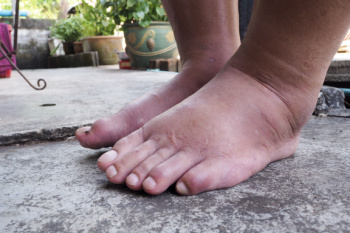
Having swollen feet, also known as foot edema, is a common issue that can occur for a variety of reasons. Simple causes include standing or sitting for long periods of time, especially in hot weather, which can lead to fluid retention. Minor injuries, such as sprains or strains, can also cause temporary swelling. However, persistent or severe swelling could signal more serious health conditions. Heart failure, kidney disease, and liver disorders can all cause fluid buildup in the lower extremities. Venous insufficiency, where the veins struggle to return blood to the heart, is another possible cause. Blood clots in the legs or infections can also trigger swelling. Treatment depends on the underlying cause. For mild cases, elevating the feet and reducing salt intake may help. If you have swollen feet from an unknown cause and especially if accompanied by pain, shortness of breath, or other symptoms, it is suggested that you contact a podiatrist promptly for an evaluation and care.
Swollen feet can be a sign of an underlying condition. If you have any concerns, contact Deann Hofer Ogilvie, DPM of Ascend Foot & Ankle Center. Our practitioner can provide the care you need to keep you pain-free and on your feet.
Swollen feet are a common ailment among pregnant women and people who stand or sit for extended periods. Aging may increase the possibility of swollen feet and patients who are obese often notice when their feet are swelling too. There may be medical reasons why swollen feet occur:
- Phlebitis - A condition that causes the veins to become inflamed and can also cause leg pain.
- Liver disease - This may lead to low blood levels of albumin which is a protein. This can cause fluid in the blood to pass into the tissues and several areas of the body can become swollen.
- Heart failure - When the heart doesn’t pump properly the blood that is normally pumped back to the heart can pool in the veins of the legs causing swollen feet.
- Kidney disease - One of the main functions of the kidneys is releasing excess fluid in the body. This type of condition can make it difficult for the kidneys to function properly, and as a result the feet may become swollen.
- Deep-vein thrombosis (DVT)- This is a serious condition where blood clots form in the veins of the legs. They can block the return of blood from the legs to the heart which may cause the feet to swell. It is important to be treated by a podiatrist if this condition is present.
Swollen feet can also be caused by bone and tendon conditions, including fractures, arthritis, and tendinitis. Additionally, there may be skin and toenail conditions and an infection may cause the feet to swell. Patients who take medicine to treat high blood pressure may be prone to getting swollen feet.
Many patients elevate their feet to help relieve the swelling and this is generally a temporary remedy. When a podiatrist is consulted the reason behind the swelling can be uncovered and subsequently treated.
If you have any questions please feel free to contact our office located in Lafayette, CO . We offer the newest diagnostic tools and technology to treat your foot and ankle needs.
Orthotic Treatment for Leg Length Discrepancies
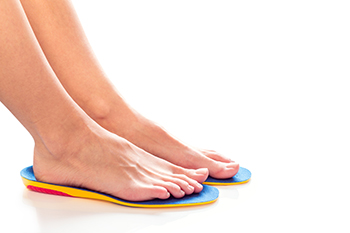
Orthotic insoles can be helpful for people with mild leg length discrepancies, a condition where one leg is slightly shorter than the other. This difference, even if small, can affect how a person walks, causing discomfort or pain. Orthotic insoles are designed to help balance the body and improve how the legs and feet move together. Research shows that using custom orthotics can improve gait symmetry, meaning the walking pattern becomes more even and natural. By leveling out the legs, insoles help reduce immediate pain and discomfort caused by uneven pressure on the feet, knees, hips, and lower back. If you are experiencing foot pain and you know your legs are slightly different lengths, it is suggested that you schedule an appointment with a podiatrist who can provide appropriate treatment, which may include custom orthotics.
If you are having discomfort in your feet and would like to try orthotics, contact Deann Hofer Ogilvie, DPM from Ascend Foot & Ankle Center. Our practitioner can provide the care you need to keep you pain-free and on your feet.
What Are Orthotics?
Orthotics are inserts you can place into your shoes to help with a variety of foot problems such as flat feet or foot pain. Orthotics provide relief and comfort for minor foot and heel pain but can’t correct serious biomechanical problems in your feet.
Over-the-Counter Inserts
Orthotics come in a wide variety of over-the-counter inserts that are used to treat foot pain, heel pain, and minor problems. For example, arch supports can be inserted into your shoes to help correct overarched or flat feet, while gel insoles are often used because they provide comfort and relief from foot and heel pain by alleviating pressure.
Prescription Orthotics
If over-the-counter inserts don’t work for you or if you have a more severe foot concern, it is possible to have your podiatrist prescribe custom orthotics. These high-quality inserts are designed to treat problems such as abnormal motion, plantar fasciitis, and severe forms of heel pain. They can even be used to help patients suffering from diabetes by treating foot ulcers and painful calluses and are usually molded to your feet individually, which allows them to provide full support and comfort.
If you are experiencing minor to severe foot or heel pain, it’s recommended to speak with your podiatrist about the possibilities of using orthotics. A podiatrist can determine which type of orthotic is right for you and allow you to take the first steps towards being pain-free.
If you have any questions please contact our office located in Lafayette, CO . We offer the newest diagnostic and treatment technologies for all your foot and ankle needs.
Foot Problems in the Elderly
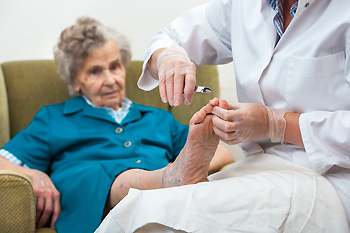
As we age, changes in foot structure can lead to common problems that affect mobility and comfort. Older adults may experience a loss of the fat pad under the foot, joint stiffness, decreased muscle strength, and flattening of the arch. These changes can cause foot pain, making daily activities more difficult. Foot pain in seniors is a significant concern because it increases the risk of falls and can alter a person’s walking pattern, leading to further issues with balance and stability. People with foot pain are also less likely to stay active, which can impact overall health. Common foot problems in older adults include arthritis, bunions, corns, calluses, and plantar fasciitis. Regular foot care, proper footwear, and conferring with a podiatrist can help manage these issues, improve comfort, and maintain mobility. If you are elderly or taking care of someone who is older and foot pain surfaces, it is suggested that you schedule an appointment with a podiatrist for a proper diagnosis and appropriate treatment.
Proper foot care is something many older adults forget to consider. If you have any concerns about your feet and ankles, contact Deann Hofer Ogilvie, DPM from Ascend Foot & Ankle Center. Our practitioner can provide the care you need to keep you pain-free and on your feet.
The Elderly and Their Feet
As we age we start to notice many changes in our body, but the elder population may not notice them right away. Medical conditions may prevent the elderly to take notice of their foot health right away. Poor vision is a lead contributor to not taking action for the elderly.
Common Conditions
- Neuropathy – can reduce feeling in the feet and can hide many life-threatening medical conditions.
- Reduced flexibility – prevents the ability of proper toenail trimming, and foot cleaning. If left untreated, it may lead to further medical issues.
- Foot sores – amongst the older population can be serious before they are discovered. Some of the problematic conditions they may face are:
- Gouging toenails affecting nearby toe
- Shoes that don’t fit properly
- Pressure sores
- Loss of circulation in legs & feet
- Edema & swelling of feet and ankles
Susceptible Infections
Diabetes and poor circulation can cause general loss of sensitivity over the years, turning a simple cut into a serious issue.
If you have any questions please feel free to contact our office located in Lafayette, CO . We offer the newest diagnostic and treatment technologies for all your foot and ankle needs.
Treating Pain From Flat Feet
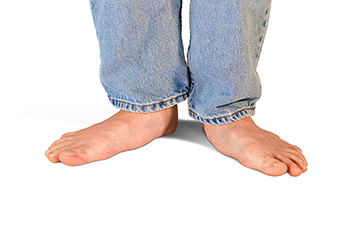
Flat feet, also known as fallen arches, occur when the arches of the feet collapse or are not properly developed. This condition can cause the entire foot to make contact with the ground while standing. Flat feet may be caused by genetics, injury, aging, or conditions like obesity and arthritis. Common symptoms include foot pain, particularly in the arch or heel, swelling, and discomfort during physical activities. Some people may experience knee, hip, or lower back pain due to the altered biomechanics of the body. Diagnosis typically involves a physical examination and imaging tests like X-rays to assess foot alignment. Treatment options range from wearing supportive footwear and custom orthotics to surgery for severe cases. While many people live comfortably with flat feet, untreated cases can lead to complications like tendonitis, arthritis, and chronic pain. If you have pain from flat feet, it is suggested that you consult a podiatrist for a diagnosis and pain-relieving treatment.
Flatfoot is a condition many people suffer from. If you have flat feet, contact Deann Hofer Ogilvie, DPM from Ascend Foot & Ankle Center. Our practitioner will treat your foot and ankle needs.
What Are Flat Feet?
Flatfoot is a condition in which the arch of the foot is depressed and the sole of the foot is almost completely in contact with the ground. About 20-30% of the population generally has flat feet because their arches never formed during growth.
Conditions & Problems:
Having flat feet makes it difficult to run or walk because of the stress placed on the ankles.
Alignment – The general alignment of your legs can be disrupted, because the ankles move inward which can cause major discomfort.
Knees – If you have complications with your knees, flat feet can be a contributor to arthritis in that area.
Symptoms
- Pain around the heel or arch area
- Trouble standing on the tip toe
- Swelling around the inside of the ankle
- Flat look to one or both feet
- Having your shoes feel uneven when worn
Treatment
If you are experiencing pain and stress on the foot you may weaken the posterior tibial tendon, which runs around the inside of the ankle.
If you have any questions please feel free to contact our office located in Lafayette, CO . We offer the newest diagnostic and treatment technologies for all your foot and ankle needs.
Definition and Risk Factors of Sever’s Disease
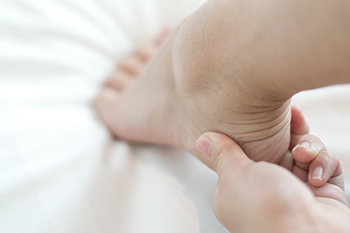
Sever's disease, medically known as calcaneal apophysitis, is a common condition affecting children and adolescents, particularly those who are active in sports. Coined by Dr. Warren Sever in 1912, this condition involves inflammation of the growth plate at the heel, causing heel pain and discomfort. It typically occurs during periods of rapid growth when the Achilles tendon pulls on the developing heel bone. Risk factors for Sever's disease include engaging in high-impact sports, improper footwear, and participating in activities that involve frequent jumping or running. The condition is often characterized by pain and tenderness at the back of the heel, which can worsen with physical activity. If your active child has heel pain, it is suggested that you schedule an appointment with a podiatrist who can accurately diagnose and treat Sever’s disease.
Sever's disease often occurs in children and teens. If your child is experiencing foot or ankle pain, see Deann Hofer Ogilvie, DPM from Ascend Foot & Ankle Center. Our practitioner can treat your child’s foot and ankle needs.
Sever’s Disease
Sever’s disease is also known as calcaneal apophysitis, which is a medical condition that causes heel pain I none or both feet. The disease is known to affect children between the ages of 8 and 14.
Sever’s disease occurs when part of the child’s heel known as the growth plate (calcaneal epiphysis) is attached to the Achilles tendon. This area can suffer injury when the muscles and tendons of the growing foot do not keep pace with bone growth. Therefore, the constant pain which one experiences at the back of the heel will make the child unable to put any weight on the heel. The child is then forced to walk on their toes.
Symptoms
Acute pain – Pain associated with Sever’s disease is usually felt in the heel when the child engages in physical activity such as walking, jumping and or running.
Highly active – Children who are very active are among the most susceptible in experiencing Sever’s disease, because of the stress and tension placed on their feet.
If you have any questions, please feel free to contact our office located in Lafayette, CO . We offer the newest diagnostic and treatment technologies for all your foot and ankle injuries.

